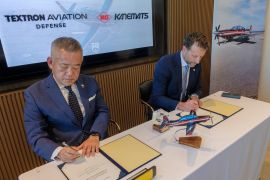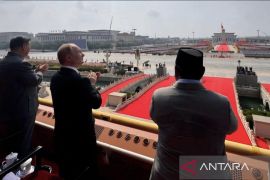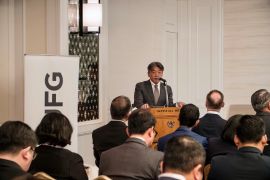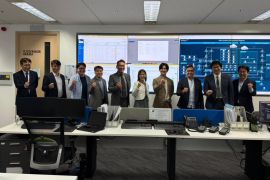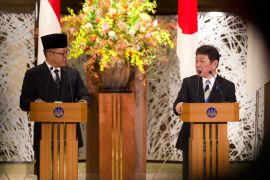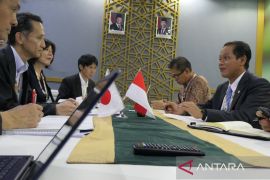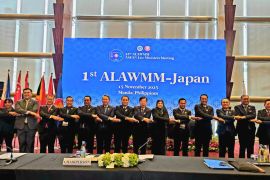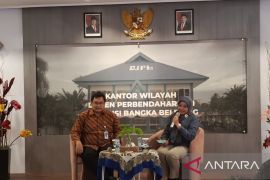"The visit by a Keidanren delegation to Indonesia earlier this week is an alternative step taken by Japan to face China`s growing influence here," said Sofyan Wanandi, chair of the Indonesian Businessmen`s Association (Apindo), on Wednesday.
Wanandi said Keidanren is very influential in the Japanese economic system due to the fact that it is a solid grouping of the country`s industries. Thus, whenever Keidanren sends a big delegation to any country personally led by its chairman, those in the know would understand the significance of the visit.
Accompanying Keidanren chairman Yonekura Hiromasha during the visit were Keidanren board of councillors chairman Watari Fumiaki, Mitsubishi Corp.Vice Chairman Sasaki Mikio, Dai-ichi Life Insurance Vice Chairman Morita Tomijiro, Toray Industry Vice Chairman Sakakibara Sadayuki, Mizuho Financial Group Vice Chairman Maeda Terunobu and Mitsubishi Heavy Industries Vice Chairman Tsukuda Kazuo.
Wanandi said that Tokyo had been quite aware of the fast growing economic ties between Indonesia and China which has grown at the rate of 25 percent annually since 2001. Jakarta-Beijing bilateral trade has been projected at 50 billion US dollars by 2014 with the 2010 trade figure already reaching 35 billion dollars.
According to Wanandi, Jakarta however would not that easily leave Japan to become close to China considering the fact that Japan had strongly supported Indonesia in its various stages of economic development since the 1960s.
"I think Indonesia can take advantage of this recent approach by Japan. Indonesia can try to attract more investment from Japan," said Wanandi who nevertheless reminded the Indonesian government to shape up and improve the infrastructures so that investments would flow in more smoothly.
In a similar vein, the Indonesian Institute of Sciences (LIPI`s) economic observer Latif Adam noted that the visit by Keidanren was a form of recognition from Japan that Indonesia really is of strategic importance to Tokyo economically. Japan viewed Indonesia this way as it has been facing acute economic woes.
Adam said that Keidanren was an association of at least 100 major corporations and what was more important, Keindanren was always included in decision-making for investment, export and import policies taken by the Japanese government. Taking the fact into consideration, Indonesia could therefore take advantage by getting into Japan`s global production networking.
China`s Advances
Keidanren had agreed to focus on five main economic fields in its cooperation with Indonesia. "They are committed to development while focusing on five main fields," Economic Coordinating Minister Hatta Rajasa said after a meeting with the Keidanren delegation at his office on Monday.
The five main fields were transportation infrastructure such as railroads, marine ports, airports, roads and economic corridors in Java. In addition, the Japanese side was interested in energy supplies from renewable sources such as geothermal and low carbon emissions coal.
"They will also cooperate in any necessary fields that are related to industrial expansion, especially outside Java Island which are to be connected with ports," said Minister Rajasa, who welcomed the delegation. The Japanese delegation had earlier made courtesy calls on President Susilo Bambang Yudhoyono and Vice President Boediono.
In a more general perspective, according to available data, Japanese firms still have more investment in Indonesia than in any other Southeast Asian country and presently there are around 1,000 Japanese companies operating in Indonesia employing some 300,000 local staff.
The Indonesian Investment Coordinating Board (BKPM) calculates Japanese firms have invested more than 40 billion dollars in Indonesia in the last 30 years but inflows have steadily fallen dramatically since 1997.
This reflects a relocation of existing Japanese investment from Indonesia to neighboring countries due to a diminishing comparative advantage in labor costs and concerns over the country`s institutional and physical infrastructure, according to observers.
The total trade volume between China and Indonesia were projected to have reached 40 billion dollars in 2010. Bilateral trade from January to October 2010 has reached 33.75 billion dollars, a 53.6 percent increase compared to same period in 2009.
China and Indonesia is increasing 25 percent per year, because China saw Indonesia as a strategic partner, according to Zhang Qiyue, Chinese ambassador to Indonesia, in a seminar late in 2010.
To date, China`s investment in Indonesia has reached the level of 35 billion US dollars since diplomatic relations between the two countries resumed in 1990. Trade and investment have kept increasing steadily in terms of volume and value, observed Makmur Kellat, a China watcher.
Both countries also signed a strategic partnership in 2005 in which cooperation (not only in the economic but also the culture and defense sectors) was included in the agenda to strengthen existing relations.
Other efforts are also underway to sustain the impressive achievements in trade, investment and energy cooperation, for example, through trade fairs and regular meetings between the business community and policy makers.
Almost no one doubts that Japan, the United States and Europe`s role in investment in Indonesia can be overtaken by China, Kellat said.
With the view to building roads, bridges, ports and the energy sector, it is no wonder government institutions in Jakarta dealing with foreign investment are very keen to tap into China`s massive foreign reserves. (*)
Reporter: By Vicki Febrianto
Editor: Kunto Wibisono
Copyright © ANTARA 2011
